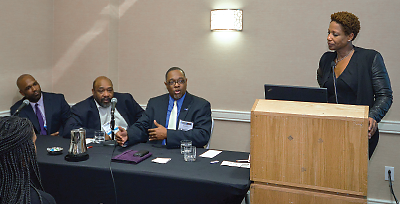The relationship between African Americans and the general and mental health care systems has a rocky history, the effects of which remain today, said several psychiatrists at a session at APA’s 2013 Institute on Psychiatric Services in Philadelphia in October.
Physicians in the 19th century used “scientific” arguments to justify black inferiority and the practice of slavery, said Janet Taylor, M.D., M.P.H., a community psychiatrist in New York. In the 20th century, the notorious Tuskegee study from 1932 to 1972 left hundreds of impoverished black men without treatment for syphilis for decades after the discovery of antibiotics that could have treated the disease.
Centuries of discrimination, unequal access to education and employment, and institutionalized racism continue to infuse every aspect of physical and mental health. “Racism has shaped our understanding of status, power, and social stratification,” she said. “It has left African Americans with a sense of inferiority and self-hatred, and those negative feelings get internalized.”
The problem is especially acute for black men, she said. They frequently have poor general health outcomes, partly because of long delays in seeing a doctor because they don’t wish to be seen as “weak.”
“Black men have fewer preventive care visits, lower life expectancy, and increased morbidity and mortality from preventable conditions, compared with other demographic groups,” she noted.
“There is then a delay in recognizing mental health symptoms because so many physical symptoms must be dealt with first,” said Taylor. This “crowd-out effect” only furthers disparities in who gets access to mental health care.
“In addition, African Americans are perceived to be more violent, so a lethal response is considered more acceptable, even if the target individual is mentally ill or just in the wrong place at the wrong time, as in the case of Trayvon Martin,” said William Lawson, M.D., Ph.D., chair of psychiatry at Howard University.
Lawson recalled the 2001 U.S. surgeon general’s report on mental health, which concluded that blacks were less likely to get mental health services and more likely to get poorer-quality care than whites.
“Blacks are more likely to receive no diagnosis or less-optimistic diagnoses, too.” said Lawson. “They are diagnosed with schizophrenia at a much higher rate than whites, despite research showing no actual differences in rates of occurrence, but they receive mood disorder diagnoses less often.”
When it comes to treatment, even though pharmacokinetics research has shown that people of African ancestry metabolize many psychotropic drugs more slowly, blacks continue to be prescribed higher doses of medication and are more likely to be exposed to polypharmacy, leading to greater toxicity, he said.
African Americans also have to navigate along a poorly defined line between “mad” and “bad,” in Lawson’s words. “Aberrant behavior is more likely to send them into the criminal justice system, a punitive approach to mental illness,” he said. Once there, they are vulnerable to diseases such as hepatitis, tuberculosis, or HIV that permeate back into the community after release. Mental health treatment begun in prison may be discontinued or delayed on release as well, he emphasized.
While legalized racism has been formally abolished in the United States, more insidious forms, such as racial profiling, still exist, said Karriem Salaam, M.D., a clinical assistant professor of psychiatry at Drexel University College of Medicine.
Less obvious are “microaggressions,” a term coined in 1977 by psychiatrist Chester Pierce, M.D., that denotes “subtle, stunning, often automatic, and nonverbal exchanges” with negative overtones, he said. The effects of this on children are especially noteworthy, said Salaam, a child and adolescent psychiatrist: “Increased risk taking, externalizing, and physical aggression” are often the results.
A range of solutions must be used to overcome this combination of history and disparity, Taylor suggested. Early intervention with children is one key, as is teaching black men that taking control of their health is an act of power, not weakness.
Psychiatrists and other physicians might adopt a strength-based approach that focuses on developing self-reliance and resiliency, said Salaam. “But we must also focus on what can be controlled—one’s own actions—rather than what cannot be controlled, like the beliefs of others, and develop community-based resources to encourage mental health treatment.”
“Ultimately, we must also acknowledge racism and bias in medicine and then eliminate it by developing cultural sensitivity across the health system,” said Taylor.
“Whenever psychiatrists meet, conversations like this are important in order to highlight the social injustices that still exist in the U.S. and their profound impact on mental health,” noted Annelle Primm, M.D., M.P.H., APA deputy medical director and director of the Office of Minority and National Affairs, who introduced the session. “Having an opportunity to dialogue on this subject can be a catalyst for psychiatrists to become a part of the solution in clinical settings as well as in their communities,” she said. ■

